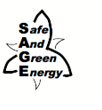Four NGOs call for shutdown, protest re-licencing.
from Safe And Green Energy (SAGE)
Emissions of radioactive tritium from a Peterborough area nuclear facility situated at the Peterborough Municipal Airport are many times higher than previously reported, and more than twice the maximum annual release allowed by the company's existing licence for 2010 and 2011.
This has prompted four non-governmental organizations to demand that the Canadian Nuclear Safety Commission (CNSC) direct the facility to cease all tritium operations, and postpone hearings into a new licence for the facility. The tritium-release information comes from a preliminary report made public last week by Shield Source Incorporated (SSI), the tritium-light factory in question.
The Canadian Environmental Law Association yesterday sent a letter to the CNSC on behalf of Safe And Green Energy (SAGE) — a Peterborough-area group — asking the regulator to direct the SSI plant to shut down its tritium operations, and to delay the hearing on a 10-year licence renewal sought by the facility operator, currently scheduled for May 2, 2012.
Three other groups — Sierra Club Canada, Concerned Citizens of Renfrew County, and the Canadian Coalition for Nuclear Responsibility — are supporting the SAGE initiative.
Tritium is radioactive hydrogen. Like all radioactive materials, tritium is a carcinogen, a mutagen and a teratogen — it can cause cancer, genetic damage, and developmental abnormalities in unborn children. It is routinely created in the heavy water of CANDU reactors as an unwanted and hazardous byproduct of nuclear fission.
Since 1990 a Tritium Removal Facility (TRF) at Darlington has been used to remove tritium from heavy water so as to reduce workers' radiation exposures and to limit tritium contamination of the environment. SSI buys tritium from the TRF and uses it to make self-illuminating devices.
But three weeks before the start of a hearing where the company would be seeking a 10-year renewal of its licence to manufacture tritium light sources, the company reported to the CNSC — Canada's nuclear regulator — that one of its consultants had found "increased stack emissions" of tritium from the facility. Emissions measured by the consultant were over ten times higher than those measured by the company.
SSI has since recalculated its tritium emissions for the years 2010 and 2011 at five to nine times the levels previously reported. The new levels are more than twice the release limits allowed by the CNSC licence.
"Under these circumstances the company should be directed to cease operations immediately" said Jeff Brackett, a spokesperson for SAGE. "The CNSC needs to inform the public how the reporting errors occurred, why they were not detected sooner by the regulator, how many years of data are affected, and the causes and consequences of the much higher releases of radioactive tritium gas that have taken place. CNSC must postpone the public hearing into the SSI licence renewal until a full investigation has been concluded."
"We question whether SSI should be licensed to operate at all, since their emissions contravene one of the stated purposes of the Tritium Removal Facility: to segregate tritium from the environment so as to reduce offsite radioactive contamination," said Dr. Gordon Edwards of the Canadian Coalition for Nuclear Responsibility, another group intervening in the upcoming hearings.
"Canadians need to know whether regulations are meaningful and are being enforced, or not — especially in a field as important and as controversial as nuclear power and the management of radioactive waste materials," said John Bennett, Executive Director of Sierra Club Canada, also a registered intervenor.
"What is most disheartening about the current situation at SSI is that very similar problems were identified several years ago at another tritium-light factory, SRB Technologies, located in Pembroke, also licenced by the CNSC. Why have the lessons of the past not been learned?" said Dr Ole Hendrickson of the Concerned Citizens of Renfrew County.
"Applicants for licences under federal nuclear legislation are required to provide accurate information in support of their applications. When questions arise as to the accuracy of such pre-filed information, fairness and the public interest dictate that the regulator pause before going forward with a hearing and possibly approving a licence that could have significant environmental health and safety consequences for a community", said Joseph F Castrilli, a lawyer at the Canadian Environmental Law Association representing SAGE.
For more information on Tritium visit ccnr.org and select Troubles With Tritium from the hot-linked Directory.
References
Letter to the Canadian Nuclear Safety Commission, April 19, 2012
© Copyright 2012 SAGE, All rights Reserved. Written For: StraightGoods.ca


Sorry, the comment form is closed at this time.